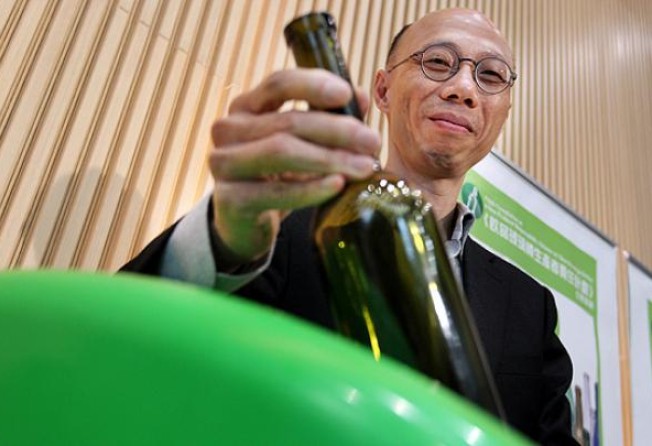Government unveils plan for HK$1 recycling levy on glass bottles
Water and juice containers will be added to the list under the government’s plans to raise millions to recycle the glass locally

People would need to pay a recycling levy on water and fruit juices sold in glass bottles, not just bottled beers and wine, under a government proposal.
Under the plan - unveiled by the Environment Bureau on Thursday for a three-month public consultation - about 1,700 importers and distributors will be subject to a levy based on either the volume or number of bottles involved.
Environment officials say the initial levy could be around HK$1 per one-litre bottle. How the fee would be divided between importers, wholesalers, retailers and consumers would be a matter for "market forces".
The levy would raise tens of millions of dollars a year, which would go towards hiring a contractor to set up a glass-waste recovery network and handle collection logistics.
Environment Secretary Wong Kam-sing said he hoped the levy would help recover 70 per cent of glass waste.
Although Wong said glass bottles of sauce and food would be excluded from the proposal at this stage as they were more difficult to clean prior to recycling, he would not rule out the possibility of the fee eventually being imposed on them.
"If awareness is increased, we can consider expanding the scheme," he said.
But the proposal has already drawn opposition from wine merchants, who favour a system that would tax consumers directly instead.
The planned levy will do little to motivate consumers to return their bottles for recycling, said Henry Ho Yiu-hong, president of the Wine Merchants Chamber of Commerce, yesterday.
"If the levy is paid at import level, it will be hidden in the retail price, and this will have no impact on the public's environmental awareness," he said. It was preferable for consumers to pay a fee when they bought wine.
The chamber said the retail price of bottled drinks could go up by more than the levy itself because of the administrative costs involved.
"A medium-sized bar could sell more than 10,000 bottles of beer a month, and this would mean we have to pay HK$10,000 more," said Chin Chun-wing, vice-chairman of the Bar and Club Association.
Chin wants the government to provide businesses with incentives to separate glass waste. He said limited space and manpower were the main obstacles to them doing so.
The government proposes exempting beverage suppliers who have their own voluntary deposit and refund system or bottle recovery system. But officials have yet to set out performance criteria for the exemption.
Hong Kong generates about 55,000 tonnes of beverage glass waste - equivalent to 110 million 750ml bottles - each year. This accounts for just three per cent of the total amount of waste dumped in landfills.
Every year, only about 1,500 tonnes of this glass waste is recycled, most of which is converted into environmentally friendly bricks for the paving of roads.
Friends of the Earth said the glass-bottle levy was a watered-down version of a supposedly comprehensive scheme which included charging a fee for beverages in plastic and tin containers.